
BMW 7 Series Review & Pricing

Introduction
The 7 Series is BMW’s long-serving flagship luxury executive car. For over 40 years and six generations, it’s served as the more understated option for those in the market for a stately limousine.
It’s always been the model to set the precedent, technologically and stylistically, for the rest of the marque’s saloon range, with the cutting-edge developments in the 7 filtering their way down to the 5, 3 and beyond. That doesn’t change for this sixth-generation car, which not-so-subtly introduced us to the rapidly-growing BMW kidney grille at its recent facelift.
Despite the bold visage, the 7 Series has retained its smooth chiselled lines and a general sense of restraint. You don’t want to upset the bosses, after all.
Review Sections
Select's rating score* - 3.8 / 5
At a Glance
Time once was that if you wanted a big luxurious saloon, you had to get all showy with a Bentley or a Rolls-Royce. The BMW 7 Series, Mercedes-Benz S-Class and latterly, the Audi A8, changed that, offering the same cabin space, refinement and better equipment, without the unfettered opulence, in more subtle and inexpensive machines. A boon for luxury-loving motorists that wanted to fly under the radar a bit.
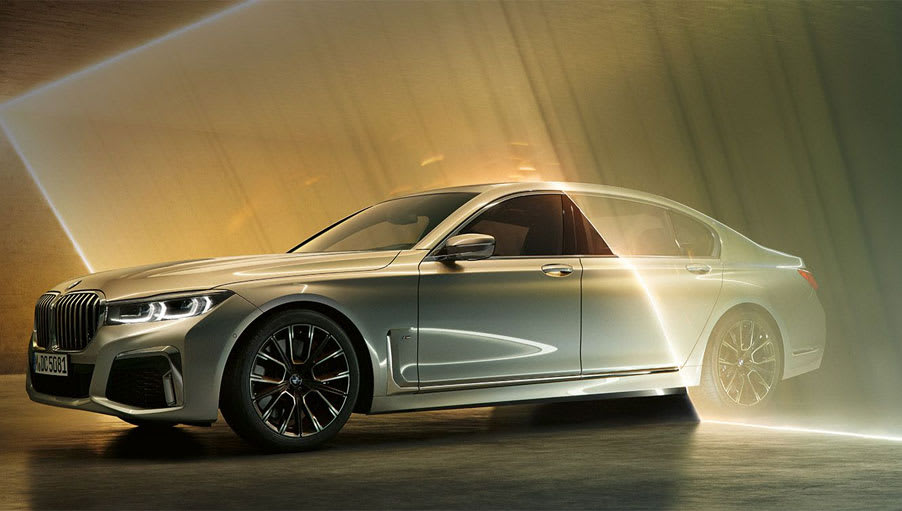
The irony is that the 7 Series, in its 40 years on sale, has picked up a bit of a reputation as a status symbol, being the limousine of choice for gangsters, rappers and other high-status figures seeking lower-key luxury. Back in the real world, the 7 Series and cars like it have never been sales titans, but their market share is now smaller than ever as large SUVs take precedence amongst buyers.
But their presence in the lineup is justified, as a symbol of enduring brand values. Porsche wouldn’t kill the 911, so why would BMW kill the 7 Series?
There’s a BMW 7 Series for everyone - assuming you’ve got the cash - from economical diesel models, eco-friendly(ish) plug-in hybrid models, and M Sport-tuned petrol-powered behemoths. Add in regular or long-wheelbase choices, and an options list as long as your arm, and you’ll be able to find your perfect 7 Series. If not, the BMW Individual bespoke personalisation programme will ensure that one is built just for you.
After 40 years, the BMW 7 Series remains one of the most capable, technologically advanced, refined and luxurious cars on the road, serving to lead the way for the junior 5 Series and 3 Series models.
Key Features
Cutting edge technology has always been a selling point of the BMW 7 series but now, six years on since the latest models introduction, some of the more impressive points look a little more like gimmicks. A huge key fob with a 2.2-inch screen that you need to charge frequently looked spectacular at launch but just irritates now.
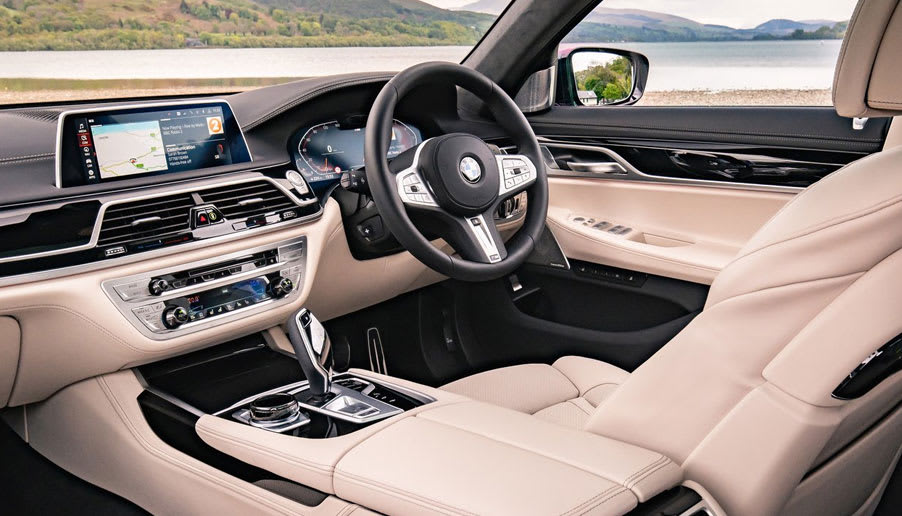
Fortunately, BMW has spent just as long focussing on luxury as it has technology. Yes, it’s loaded with toys, and it’s still the best luxury car to drive, but the key difference is that it's now right at the top of the class for opulence.
Adjustable air suspension keeps as many of the road’s imperfections away from you as possible, without removing any of the communication, while armchair-like seats are both sumptuously comfortable and impressively supportive. Four-zone climate control, soundproofed windows, impeccably damped switches and stunning material quality keep the sensations and richness coming all journey long.
Performance & Drive
The 3.0-litre twin-turbo diesel engine fitted to our test model might be the frugal choice, but the 286hp it provides, and the monstrous 650Nm of torque supplied alongside, makes it move like a sports car. The 0-62mh dash is dispatched in just 5.6 seconds, and it’ll go on to a limited 155mph. We know, we checked. The 740d adds even more power with barely a hit to economy.
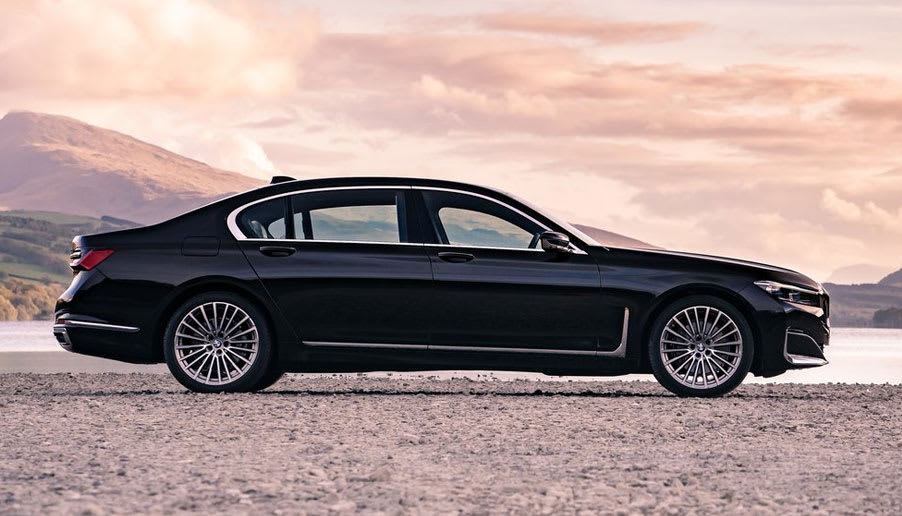
The plug-in hybrid model matches our diesel for power but, thanks to the boost of the electric motor, it’s a slightly quicker machine despite the weight of the battery pack and extra motor.
The 750i, driven by a 4.4-litre V8 petrol engine, takes the car to ridiculous performance levels, but don’t think you’ll get good economy from it. If you hit 30mpg, it’ll be a miracle.
But outright speed isn’t the point of the 7 Series, even if it does underline just how capable a car it is. The air suspension masks the road surface below, leaving you with a supremely comfortable ride, but you'll pay the price at the first corner where the car wobbles around a little too much. A Sport mode stiffens the car to a level where you can cross a country with surprising alacrity, but at the expense of that sublime ride quality. Swings and roundabouts.
It’s most at home on the motorway, without any doubt, where it'll cruise along at very illegal speeds all day without breaking a sweat. Show it a city centre and it’s less comfortable, but that’s mostly down to its 5.3m long and more than 2.0m wide body. Beyond its size, it’s easy to drive, with light steering and cameras all around that help to pinpoint any obstacles you might not have spotted from so far away.
Running Costs & Emissions
The most electrified business-friendly version is the plug-in hybrid 745e, which is good for a maximum of 32 miles on electric-only power. A stated 134mpg and a BIK rate of 11% will appeal to business users, thanks to its 48g/km of CO2 emissions.
The rest of the range consists of six-cylinder diesels, a six-cylinder petrol and a full-fat 530hp V8. Sadly, the gas-guzzling V12 flagship is no longer available. Arguably the sweet spot in the range, the 730d M Sport rear-driven version will crack 51mpg according to official economy figures. Over a 1,035 mile jaunt to Frankfurt and back, our 730d got through 115 litres of diesel, which translates to 40.9mpg - not bad when we fully tested its high-speed autobahn credentials.
All 7 Series models produce under 250 g/km of CO2, now that the V12 has disappeared. BMW has made a good fist of cleaning up its combustion engines, with even these larger motors in what is a big heavy car being far from the dirtiest in the world.
All that said, the 745e plug-in hybrid is the one to have for the CO2 conscious. If electric power isn’t your style, the rear-driven 730d, in addition to being the most economical on a run, is the cleanest, putting out a low of 144g/km.
With all 7 Series models being a fair whack over £42,000, they will incur the highest car tax rates for the first few years of ownership, though the PHEV gets a free pass for the first year.
Being a high-end BMW, associated servicing costs at dealers will be higher than your average econobox. That said, there are service deals to be had, with fixed pricing and annual plans available. It’s all backed by a three-year, unlimited mileage warranty, too.
Interior & Technology
If stretching out is what’s important to you, then the long-wheelbase BMW 7 Series we’re putting to the test should satisfy anyone. Extended by 14cm over the standard model, all that space is given over to the rear passengers, so there’s more legroom than you’ll know what to do with. There’s also an optional Comfort Plus package available that we’ve got fitted, which includes individual rear seats that recline to a near-horizontal position along with cushion-like headrests, heating, massage functions, a TV on each side of the cabin, and even wireless headphones. It’s all controlled by a pop-out tablet that stores in the armrest - heated, of course, so you don’t get cold elbows. It creates a true Business Class ambience. Not quite Etihad Residence levels of luxury, granted, but it beats BA Club World.
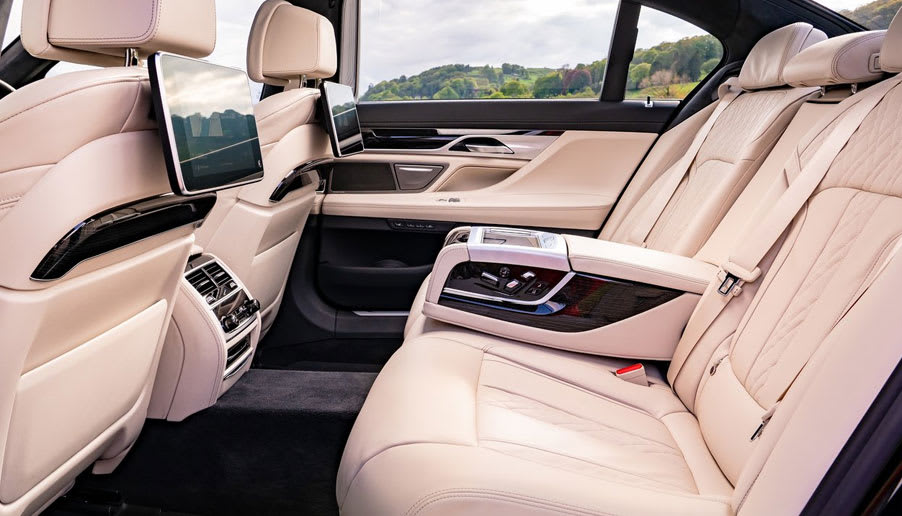
The cabin is so well insulated from the outside world that you could be forgiven for thinking you’re cruising through the clouds. Extra thick windows and huge amounts of sound insulation keep almost all noise at bay, even when hitting the autobahn at 150mph.
In the front, current BMW drivers will recognise much of what’s going on. BMW has gone with the ‘if it ain’t broke, don’t fix it’ method of updating the dashboard and simply added more leather, posher wood and extra polished aluminium. It’s a little disappointing when you can spend six figures on a 7 Series, but it all works and works well.
That said, some strange features probably looked cutting edge a few years ago, but now seem oddly dated - especially when the Mercedes-Benz EQS is just around the corner. Trinkets like the chunky key that features a low-definition 2.2-inch screen with limited functionality age the car, but that can also work in its favour; It hasn’t had a chance to ditch all its buttons for ‘hyperscreens’ or haptic feedback panels. Tactility and functionality, 7 Series staples, remain firmly intact.
Being a 7 Series, other bits of its tech still lead the industry, six years on from this generation’s initial debut. Take the standard-fit Parking Assistant Plus, which features sensors, a surround-view camera, reversing assist and the self-parking system. It has the Intelligent Personal Assistant, too, which you can use to control the car via voice commands. Saying “Hey BMW, I’m cold!” will trigger it to turn up cabin temperature, for instance. Handy, or a gimmick? A bit of both.
Practicality & Boot Space
At just under 5.3 metres long, the BMW 7 Series LWB couldn’t ever be described as practical. The hulk of a machine feels out of place on tight UK roads, but the sheer size of it means there’s plenty of room for virtually anything.
Our test model took four men to Frankfurt (it was a work trip, honest) with all of their luggage and the endless detritus created by a group of slobs stopping at seemingly every motorway service station to buy more chocolate with comedy names, without any issue at all. Cup holders galore, huge storage boxes, cubby holes and a lockable glove box made sure every stop was quick and easy.
The 515-litre boot (about the same as you’ll find in an Audi A8 or Mercedes-Benz S-Class) proved spacious enough, too. Long, deep and pleasingly square, you might struggle with bulkier items thanks to the lack of a hatchback, but there’s plenty of capacity once you’ve got your cargo in there.
Opting for the shorter wheelbase model wouldn’t have affected that, either. Yes, you lose 14cm of legroom in the rear, but the rest of the car remains identical.
Safety
A curiosity of this large luxurious class of car is that so few are sold - around 1,500 a year over the past decade - they’re rarely prioritised for crash testing by Euro NCAP. Being a BMW and given that it in part shares a platform with smaller models that have been tested, you can make some assumptions about its safety. The 5 Series got a five-star rating which, in addition to riding on the same underpinnings, also packs similar safety tech.
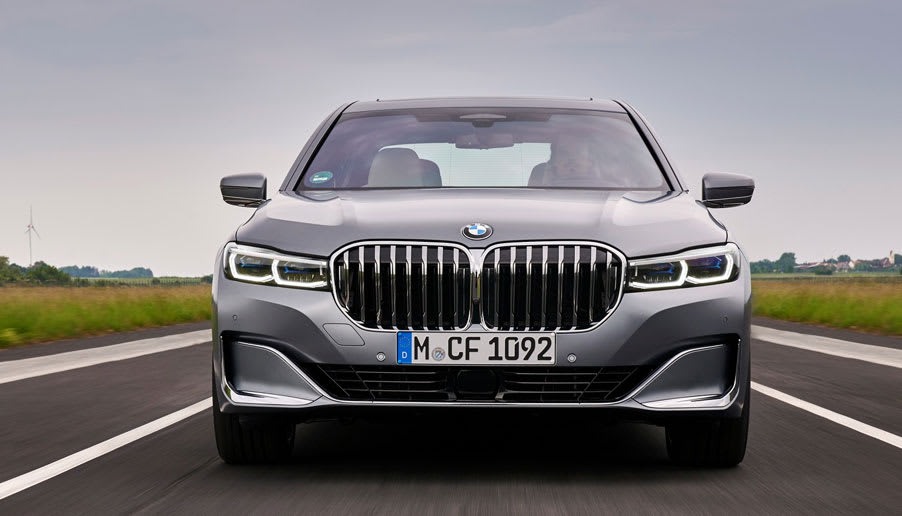
You’ll find a long list of safety technology in every BMW 7 Series, from adaptive LED headlights (there are optional laser lights) and automatic high-beam assist to a reversing assistant, automatic parking and surround-view cameras.
However, it’s a disappointment that much of the equipment you might expect is relegated to the options list. The Technology Plus Pack (from £3,295) adds a whole suite of autonomous and safety systems under the Driving Assistant Professional banner. These include collision warning systems, lane-change warning systems, steering and lane assistant, wrong-way warning, active adaptive cruise control and more.
Options
The big BMW has a spectacular box you can tick, that brings no less than 25 options into the car in one fell swoop; the Ultimate Pack will cost you between £23,000 and £27,000, depending on the model you’re having it fitted to, but will bring everything from the laser lights and the Driving Assistant Professional system to remote-control parking and M sport styling upgrades. There’s also a panoramic sunroof, massage seats, a Bowers & Wilkins audio system, a... well, a lot of stuff.
There’s no chance of the final spec sneaking up on you with how the price has inflated – it’ll hit you right in the face as soon as you specify the Ultimate Pack. The fact that the options list runs for 11 pages explains all you need to know about how far you can go with making your BMW 7 Series your BMW 7 Series. Even just picking some swish wheels, paint and leather add another £11,000…
The fact that the options list runs for 11 pages explains all you need to know about how much BMW will let you show your individuality.
Rival Cars
The BMW 7 Series has been locked in battle with the Audi A8 and Mercedes-Benz S-Class for the last 25 years, with pricing and equipment levels much of a muchness between all three cars.
The Audi A8 brings some modern cool to luxury saloons, blending impressive space and build quality with a stylish and, by the standards of the class, cutting edge design. Loaded with tech, it’s a statement of intent from Audi but is noticeably smaller inside than the BMW 7 Series or Mercedes S.
Opt for the other German rival, the Mercedes-Benz S-Class and you’ll be driving the most luxurious car this side of a Rolls-Royce. Exquisite interior design and super-smooth suspension make for a wonderful car to be driven in, but a lot of the attention-grabbing tech isn’t included in the price tag.
And then there are the forthcoming options. The days of heavy diesel-powered models may be numbered, as the battery-powered Mercedes-Benz EQS is, by all accounts, sensational.
Verdict & Next Steps
The luxury end of the car market has, for decades, been dominated by the Mercedes-Benz S-Class. It was the car to be driven in, but subtle enough that you wouldn’t be seen being driven. The BMW 7 Series always took the opposite view, and the new, bold grille means there’s no chance of hiding away from the outside world as you cross counties.
Now the two cars are closer than ever before, with the Mercedes-Benz offering a more engaging drive, and the BMW offering a step up in luxury. It’s not easy to place one above the other, as so much depends on your priorities.
One thing might just swing the balance in favour of the BMW, though; at the time of writing, leasing rates are exceptionally low. It’s possible to pick up a 7 Series for less than half the monthly payments needed for the S-Class. An easy decision, then.
Where to next?
View latest BMW 7 Series leasing deals - guide price from £487.19 per month inc VAT**
Looking for a great leasing deal? Check out our incredible range of car lease deals
New CAR Read our latest Reviews and find the right model for you
Want to know more about leasing? Take a look at our comprehensive Leasing Guides
Interested in everything motoring? Why not catch up on all the latest Car Leasing News.
*Score based on Select’s unique meta score analysis, taking into account the UK’s top five leading independent car website reviews of the BMW 7 Series
**Correct as of 18/08/2021. Based on 9 months initial payment, 5,000 miles over a 48 month lease. Initial payment equivalent to 9 monthly payments or £4,384.69 - Ts and Cs apply. Credit is subject to status.





















